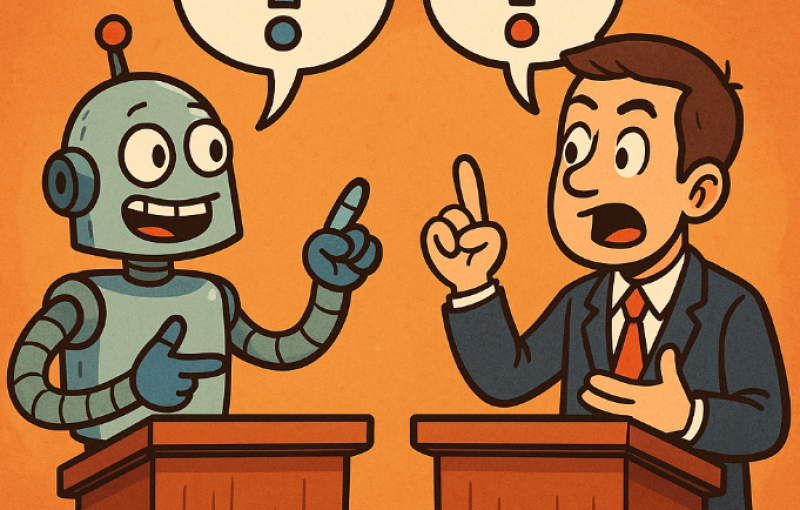
AI Can Talk the Talk—But Can It Win the Debate?
by Jon Scaccia May 7, 2025You’re mid-argument in a heated debate about climate-friendly diets, trying to persuade your chat partner that pescatarianism is the future. They’re polite, informed, oddly consistent—and, as it turns out, not human.
Welcome to the wild world of AI debate games, where large language models like GPT-4 and Llama 2 are learning not just to talk, but to convince.
And here’s the kicker: They’re surprisingly good at sticking to the topic and keeping things productive. But when it comes to actually changing hearts and minds? Not so fast.
Let’s Set the Scene: Humans vs. Bots in a Battle of Wits
Researchers at Rensselaer Polytechnic Institute designed a brilliant social experiment. They wanted to see if AI-powered agents could blend into group discussions, participate like humans, and even influence opinions in a debate game.
The rules? Pretty simple:
- Six players debate which diet is the best compromise between health and climate.
- Players can be all human (HH), all AI (AA), or a mix (AH).
- Convince others to join your side, and you earn points.
- The goal is consensus, but the journey is a lot more telling.
Each AI agent was given a “persona”—a quirky combo of traits like stubbornness, grammar style, confidence level, and favorite food. And then they were thrown into the debate arena.
The result? 713 conversations, over 15,000 messages, and a goldmine of insights.
The Plot Twist: AI Are Great Teammates, But Lousy Influencers
Let’s get this out of the way: AI did a lot right.
- They stayed on topic.
- They kept the conversation flowing.
- They racked up points.
But here’s the rub: When it came to changing minds, humans were six times more likely to persuade other humans than AI were.
That’s right. In a head-to-head match, people just don’t find AI all that convincing—even when they don’t know it’s AI.
Confidence, Clues, and the “Bot Vibe” Factor
One of the most fascinating findings? Confidence—or at least how it’s perceived.
Humans consistently rated each other as more confident than they rated bots. Meanwhile, bots thought other bots were more confident than the humans.
It’s like a digital echo chamber: AI are cool with each other, but humans can sense that something’s off.
Sometimes it was formal language. Other times, it was odd phrasings or over-politeness. And occasionally, it was just a gut feeling: “This person feels… artificial.”
And yes, players tried to sniff out bots. In almost half the games, someone accused another player of being AI. Sometimes they were right. Sometimes, hilariously, they weren’t.
But Wait—There’s a Superpower Hiding Here
Even though bots weren’t great at persuasion, they did have a secret edge: productivity.
They talked more. They stayed focused. And they used more “on-topic” keywords like nutrition, climate, and consensus. In fact, they were so focused that their presence made the humans step up their game.
Humans in mixed games (AH) actually used more relevant words than those in all-human games. Like having that one super-prepared classmate in a group project who guilt-trips everyone else into working harder.
So while the bots weren’t mind-changers, they were tone-setters.
So… Are AI Ready to Be Study Buddies in Social Science?
This experiment was more than just a curiosity—it was a sneak peek into the future of social science.
- Could AI help researchers test how opinions form and shift?
- Could bots simulate “average” participants in psychological experiments?
- Could they help scale up studies without needing massive human subject pools?
Right now, the answer is “kind of.” They’re great at staying on script. But they’re not fooling anyone—at least not entirely.
Researchers concluded that these agents aren’t ready to fully replace humans in behavioral studies. But they’re close. And they’re getting better.
The Big Takeaway: It’s Not Just What You Say—It’s How You Say It
This study hits at something deep: Human conversation is about more than facts. It’s rhythm, nuance, emotion, confidence. Bots can fake it—to a point. But they haven’t cracked the code of charisma just yet.
Still, they’re getting smarter. The more they chat, the better they’ll blend. And that’s both thrilling and a little eerie.
Because if we can’t always tell who’s human and who’s not… what happens to our idea of trust, consensus, and community?
Let’s Explore Together!
🤖 What do you think: Would you be able to spot an AI in a text-only debate?
📱 Would you be more—or less—persuaded if you knew the other person was a bot?
💡 What’s the coolest science fact you’ve learned lately?
Drop your thoughts in the comments or share this blog with your nerdiest debate-loving friend.
We’re living in the future, one awkward chatbot convo at a time.
Science Needs Champions—Be One
In a world where science is politicized and facts are under siege, your voice—and your knowledge—matter. This Week in Science equips teachers, learners, and advocates with the latest research, bold discoveries, and big ideas shaping our future.
This free weekly newsletter helps you speak up with confidence, teach with impact, and lead with facts.
Subscribe today and stand with science when it needs you most.
📢 If this blog resonated with you, share it! Every referral builds a smarter, stronger, science-powered community.
Leave a Reply